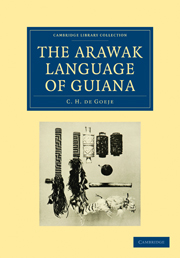Book contents
- Frontmatter
- Preface
- Contents
- List of literature
- Rules for pronunciation and abbreviations
- Alphabetical Index
- German words in Schultz' texts
- CHAPTER I Finite verb
- CHAPTER II Character of the Arawak words
- CHAPTER III Infinite verb
- CHAPTER IV Auxiliary verb a
- CHAPTER V Intensives, conjunctions, etc.
- CHAPTER VI K; B
- CHAPTER VII F; P; B
- CHAPTER VIII M
- CHAPTER IX N
- CHAPTER X D
- CHAPTER XI T
- CHAPTER XII Formation of verbs, etc.
- CHAPTER XIII L; R
- CHAPTER XIV H
- CHAPTER XV S
- CHAPTER XVI Vowels, diphotongs; colours
- CHAPTER XVII Classes of utterances; numerals
- CHAPTER XVIII Man
- CHAPTER XIX Foreign words. Arawak and Arawak-Maipure
- CHAPTER XX Origins of the Arawak language
- APPENDIX: Information collected in Surinam in 1907 and in 1928
CHAPTER XVII - Classes of utterances; numerals
Published online by Cambridge University Press: 05 October 2010
- Frontmatter
- Preface
- Contents
- List of literature
- Rules for pronunciation and abbreviations
- Alphabetical Index
- German words in Schultz' texts
- CHAPTER I Finite verb
- CHAPTER II Character of the Arawak words
- CHAPTER III Infinite verb
- CHAPTER IV Auxiliary verb a
- CHAPTER V Intensives, conjunctions, etc.
- CHAPTER VI K; B
- CHAPTER VII F; P; B
- CHAPTER VIII M
- CHAPTER IX N
- CHAPTER X D
- CHAPTER XI T
- CHAPTER XII Formation of verbs, etc.
- CHAPTER XIII L; R
- CHAPTER XIV H
- CHAPTER XV S
- CHAPTER XVI Vowels, diphotongs; colours
- CHAPTER XVII Classes of utterances; numerals
- CHAPTER XVIII Man
- CHAPTER XIX Foreign words. Arawak and Arawak-Maipure
- CHAPTER XX Origins of the Arawak language
- APPENDIX: Information collected in Surinam in 1907 and in 1928
Summary
Command, prohibition, incitement, request, answer to a question, and exclamation, are composed in the same way as a statement. Probably there is some difference in intonation, and moreover, when one expresses a command, a prohibition or an incitement, use is frequently made of the particles -li and -te, which indicate the character of the movement, and at the same time show that the speaker means motion.
Every spoken utterance only completes what the hearer already knows. or what he can conclude by the gestures and actions of the speaker and others. Therefore we can easily comprehend that especially these sorts of utterances are often very short.
See examples in § 12, and also the following:
a) b-adeka di, Adaie-li, behold, I am here. Lord, lit. thou -see me, Lord, h-onnaka n, h-eke n, toho d-ifiro-hu, take, eat: this is my body, b-osa! go thy way! h-akenakwa-te, yaha-rea w-ausa-i-li, arise, let us go hence, da fa-i, ma-ribe-n bu, I will; be thou clean, m-amaro-ni bu, not afraid, m-amaro-ni hu, fear not ye, be not affrighted, m-amaro-ni kiana hu na-bora, fear them not therefore, m-amaro-n bu, Paul, fear not, Paul, m-amaro-n bu, Sion o-tu, fear not, daughter of Sion;
b) David Aiici, The son of David (Mt. XXII, 42), m-ansi d-a, I will not, d-ausa, Adaie-li, I go, sir (Mt. XXI, 29, 30), John Baptist isi, the head of John the Baptist (Mk. VI, 24);
- Type
- Chapter
- Information
- The Arawak Language of Guiana , pp. 175 - 192Publisher: Cambridge University PressPrint publication year: 2009First published in: 1928



